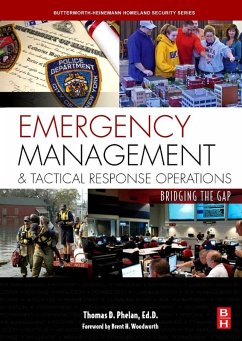*Discusses the value of emergency management education in the post-9/11 world
*Makes clear the need for educating emergency managers to prepare them for emergency manager leadership
*Helps bridge the gap between emergency management and first responders
*Should be required reading in every college emergency management curriculum
*The book is clear, concise, and an "easy read"
Dieser Download kann aus rechtlichen Gründen nur mit Rechnungsadresse in A, B, BG, CY, CZ, D, DK, EW, E, FIN, F, GR, HR, H, IRL, I, LT, L, LR, M, NL, PL, P, R, S, SLO, SK ausgeliefert werden.
"I applaud Dr. Phelan for writing this book for a number of reasons. First, I hold him in high regard, so getting someone of his caliber to take the time to share his insight and experience is a rare treat in our industry, which will benefit anyone who reads it. Second, his insight into the relationship between management and tactical operations is right on the money. Better coordination between first responders and emergency managers is key to achieving timely and well-coordinated results when minutes and dollars matter. Third, his involvement in organizations which focus on partnerships and private/public coordination is an important aspect of emergency planning that needs more attention. Organizations like Private and Public Businesses Inc., InfraGard, ChicagoFirst, the Chicago-based Lake Cook Critical Infrastructure Partnership and others across the country are doing wonderful work, but improved awareness through excellent references like this book is critical to continuing to communicate the message."--John Jackson, Executive Vice-President, Fusion Risk Management, Inc., and President, Chicago InfraGard Chapter
"NEWS FROM THIS YEAR'S WORLD CONFERENCE ON DISASTER MANAGEMENT: Tom Phelan, Ed.D., presented a breakout session titled 'Emergency Management and Tactical Response Operations: Bridging the Gap,' in which he challenged attendees to rethink some of the field's fundamentals. He suggested, for example, that emergency managers might be prepared by college courses than by experience in fire, EMS or law enforcement, and pointed out that as of January 2010, the IAEM will require a bachelor's degree for its Certified Emergency Manager designation. Fortunately, he added, there are currently about 150 college programs in emergency management or homeland security in the U.S."--Scott Baltic, editor, Homeland1 newsletter









